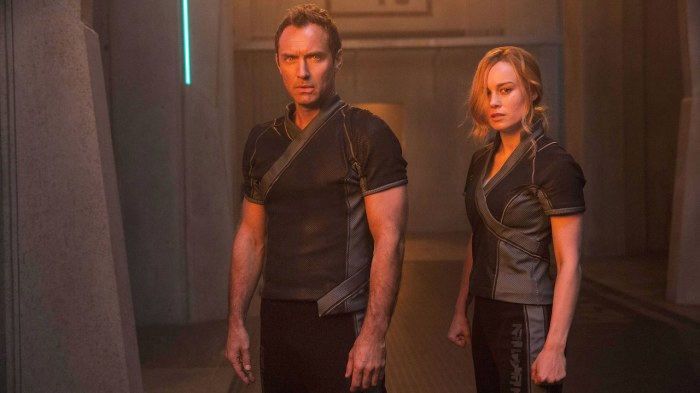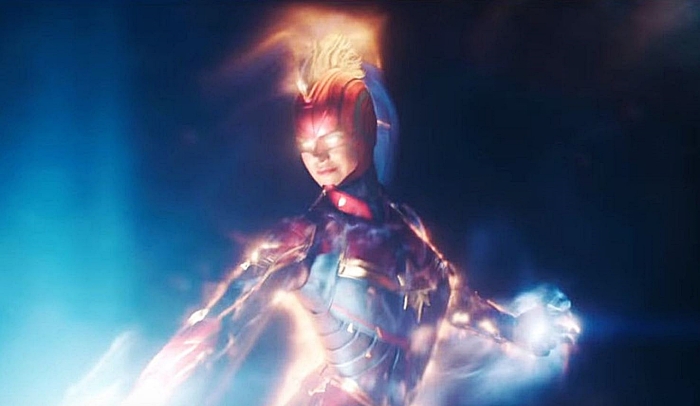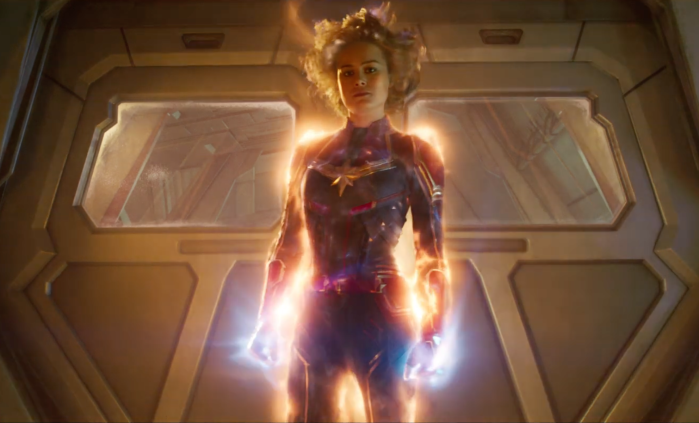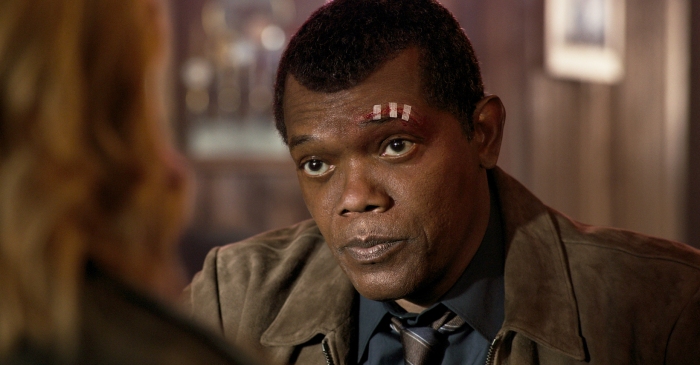Captain Marvel – the first big MCU film of 2019, and certainly not the last (with Avengers: Endgame and Spider-Man: Far from Home on the way this summer). Released on International Women’s Day, Captain Marvel is the biggest franchise in Hollywood’s first film with a female protagonist, and is also directed and co-written by women, which immediately begs the question: is it as good as Wonder Woman (i.e. really good)? Is it better? Is it worse? That’s one of many questions I’ll try to answer here, but after talking a bit about Captain Marvel and its ups and downs, I expect to naturally segue into a discussion of why Marvel movies are in a rut, and likely will be for the foreseeable future, with one or two exceptions.

Carol “Avenger” Danvers. Vers for short.
The word that jumps to mind when I think of my Captain Marvel experience is “fine.” It was fine-to-good on average, mostly because it had some great parts and some not so great parts, much like most fine things. What people reading this may care about most is the fact that it has the appropriate amount of tie-ins with the rest of the Marvel universe, in particular featuring a mid-credits scene that builds hype for Endgame in a solid and tangible way and draws exactly the connection you’re probably hoping to see. In that way and all others, it’s the origin story you’d expect, with some excellent high points involving the theme of female empowerment and a second-act turn that I must give a small amount of credit to for being the most unexpected (read: still fairly expected) part of the film. The visual effects are Marvel-grade, with the constant de-aging of Samuel L. Jackson (rookie Shield agent Nick Fury) and Clark Gregg (even more rookie Shield agent Phil Coulson) standing out as the most impressive. Brie Larson‘s performance was neither incredible nor underwhelming, with the rest of the cast (Ben Mendelsohn, Jude Law, Jackson, Gregg) doing pretty much the same across the board. Let’s face it: Marvel movies simply don’t demand much out of their actors and actresses, and that’s just fine.

Jude Law’s contacts went a pretty long way in terms of making him look like an alien – props to Captain Marvel’s makeup department.
Perhaps the most interesting aspect of the film overall is the fact that for an origin story, it more often than not fails to do one of the things that origin stories are typically responsible for: explain the protagonist’s powers. Let me be clear: it explains the origin of the powers just fine, but never really explains the powers themselves, allowing them to be pretty nebulous from start to finish and framing Carol Danvers as more of an unstoppable Superman-like hero than I’d like, especially after the climactic “becoming the true hero” scene towards the film’s end (seriously, what is that chip in her head? They never even attempt to explain this). This is a bit of a double-edged sword in that it keeps us guessing as to what Captain Marvel is capable of, which is at least mildly engaging, but is also makes her essentially infallible as I’ve already mentioned, and furthermore it cements the film as an experience that’s surprisingly not mandatory viewing pre-Endgame, given that you’ll know roughly as much about her abilities if you haven’t seen Captain Marvel as you will if you’ve only seen the trailer.

It’s about time we got an MCU hero that sports a mohawk.
But here’s the main point I want to make with this review: most of what unfolds in Captain Marvel amounts to nothing more than checking boxes, and to be clear, its creators are pretty darn good at checking those boxes. There’s no doubt that the movie has some fun moments, some funny moments, and especially some empowering moments with at least a medium-rare emotional core, but at the end of the day, it also feels like there’s very little heart in any of it. If there’s any heart anywhere, it’s probably in the film’s moral thesis of female empowerment, as it should be, but the narrative itself is largely devoid of passion, and it shows. It’s hard to blame Captain Marvel‘s creators for this, though, as it’s not hard to envision a scenario in which their potential for imagination and creativity is hamstrung by the need to stay within the MCU’s electric fence and, well, check boxes. Effective but occasionally clunky broad-strokes characterization is essentially an MCU hallmark at this point, as is a sprinkling of PG bits of situational humor that always seem to come at certain predetermined times in the films’ action, and fail among many other elements to be completely original or truly gut-busting funny. On top of that, there also looms the MCU’s biggest issue of all, and that’s the setting of stakes.

The Skrulls – the latest alien race the MCU is introducing us to.
Here’s my likely unoriginal and not-hard-to-reach conclusion about the current age of Marvel movies: they can simply no longer be interesting unless the stakes are truly titanic. To put it another way: at no point during Captain Marvel are we ever concerned about Danvers or any of her friends falling into legitimate mortal peril, and at no point are we ever concerned about Larson’s character overcoming any obstacle or achieving a given objective. Again, this is hardly the fault of the screenwriters, as they’re being told to tell a story that’s essentially predetermined, and this is a dramatic quandary that has plagued all Marvel movies for the past few years that have not been Infinity War. What made Infinity War so compelling were the titanic stakes set by Thanos, the harbinger of doom employed for numerous post-credits scenes, coming to end it all, and the fact that its creators finally had the temporal buildup to start making choices of actual import with regards to the lives and deaths of characters that we’ve been conditioned over multiple films to actually care about. An exception to this rule, and proof that this dramatic quandary can be conquered with a certain game-changing sense of style that Captain Marvel arguably lacked, was 2018’s Black Panther. Another non-Marvel piece of superhero IP that falls into this category of genre rejuvenation is Deadpool.

My perception of myself after I go to the gym once.
And yes, before you say as much: I know that in order to get lovable characters and plotline-combining epics like Infinity War, you at some point need easygoing origin stories like Captain Marvel, but at the same time, there’s only so much of this on repeat that an audience can take over a brief 10-year MCU lifetime before heading to the exits (if the box office is any indication, we clearly haven’t hit that point yet, but I feel that it’s coming). The failing of Captain Marvel (and other recent MCU films like it) to pose a dramatic question that has a difficult answer takes all of the air out of the film’s ultra-predictable and also somehow logistically confusing climactic sequence, and instead lends it to elements that are probably intended to be secondary, and gives scenes focused on Nick Fury and Phil Coulson’s backgrounds a lot more weight than was likely intended, and for a simple reason: these characters, characters with multi-movie and multi-show arcs, are the ones that we care about. In fact, chunks of the film serve as a better origin story for Fury than it does for Carol Danvers, and we the audience do get a great two-for-one deal in that way, but it also strikes me as a problem when we’re more concerned with determining how Nick Fury loses his eye than with how Captain Marvel is going to win, and become the day-saver we’re teased with at the end of Infinity War. You do find out how he loses the eye, by the way.

Pre-eyepatch post-digital-manipulation Nick Fury.
Captain Marvel certainly has the heart of Wonder Woman, and a great message, but it lacks the directing talent of its predecessor, and furthermore doesn’t seem to have as much of a spring in its step as 2017’s Amazonian adventure. While it goes through the motions and hits all of the typical beats in arguably the exact right way, it’ll be precisely what you show up expecting to see, and for that reason alone, it more often than not fails to excite or revitalize the genre. And yes – before you ask, I know full well that I’m saying all of this while lowering myself into the gears of the Marvel machine to the tune of $11 and a whopping $455 million opening weekend – the same churning gears that seem well-suited to smushing the creative will of the filmmakers the MCU has ensnared with its promise of boundless riches.